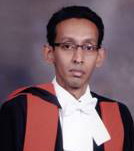 Dr. Sandagomi Coperahewa
Dr. Sandagomi Coperahewa
Department of Sinhala
University of Colombo
Dr. Sandagomi Coperahewa obtained his PhD from the University of Cambridge, UK in July 2009 under a partial financial grant from the NCAS to cover his archival fieldwork expenses and other research costs in London, Cambridge and Colombo. His main source of funding was from the auspices of a Cambridge Commonwealth Trust Scholarship. Dr Coperahewa’s PhD thesis ‘The Politics of Language in Colonial Sri Lanka, 1900-1948’ discusses the social, political and historical processes which led to the emergence of the politics of language in colonial Sri Lanka. Moving away from the dominant paradigm of post-independence language politics and beyond the usual studies of ethnic conflict in Sri Lanka, Dr. Coperahewa’s thesis focuses on the politics of language in colonial Sri Lanka, a neglected subject of study, and highlights how the question of ‘national language’/ ‘official language’ first emerged in the colonial setting and continued to the post-colonial era. This study was completed under the supervision of Dr. Francesca Orsini and Dr. Sujit Sivasundaram.
Research Abstract of PhD
THE POLITICS OF LANGUAGE IN COLONIAL SRI LANKA, c. 1900-1948
This dissertation examines the social, political and historical processes which led to the emergence of the politics of language in colonial Sri Lanka between 1900-1948. It explains the evolving sociolinguistic situation in the pre-independence period or, more precisely, elucidates the reasons behind the politicization of the country’s languages at this time. It has become a firmly established belief among political and social historians that Sri Lanka’s language controversy emerged during the I950s over the selection of an official language. Moving away from this dominant paradigm of post-independence language politics and beyond the usual studies of ethnic conflict in Sri Lanka, this thesis focuses on the politics of language in colonial Sri Lanka, a neglected subject of study, and highlights how the question of ‘national language’ / ‘official language’ first emerged in the colonial setting and continued to the post-colonial era.
This study discusses the way in which the decisions and actions of colonial officials, political elite and nationalists shaped language-related activities, and the continuing relationship between different contexts of language awareness in the pre-independence phase, and how the idea of a ‘national language’ became important to the movement for political independence. The overall argument put forward here challenges current discourses on the country’s official language, and offers a revised interpretation of the ‘Sinhala-only’ language policy. It will be shown that the official language question had already emerged by the time of independence in 1948. Utilizing previously unexamined sources, the analysis traces pre-independence discourses and ideological strands of “Sinhala-only” language policy and shows that the subsequent hegemonic demand for ‘Sinhala-only’ followed on from a colonial legacy. This historical case study of Sri Lanka thus offers a wider contribution both to the nature of the embeddedness of language in political history, and to ongoing debates on language policy planning in other South Asian colonial contexts.
The dissertation begins with a detailed survey of the linguistic, political and historical background to the formation of colonial language policies in nineteenth-century Sri Lanka. The opening chapter analyses the ways in which the different colonial powers and missionaries dealt with the question of language, with a special emphasis on the language practices and policies that were adopted under British rule. The second chapter explores the emergence of new discourses on language and identity, as Sinhala and Tamil linguistic consciousness grew, in the context of sociopolitical changes. It discusses the place of language in the 1900-1930s, paying special attention to socio-political reform, linguistic scholarship and the Aryan-Dravidian debate. The third chapter deals more extensively with the socio-political dynamics of the campaign for Sinhala language purism in the 1930s and early 1940s, and particularly on the formative role played by Munidasa Cumaratunga (1887-1944), to illustrate the ways in which language was used as a tool for strengthening Sinhala national identity. Chapter 4 is organized thematically around the politics of ‘mother tongue’ education in the formal educational system, and early twentieth century efforts to adopt the country’s local languages as the medium of education and governance. By exploring the political discussions about concepts such as ‘mother tongue’, (mauv basa), ‘own language’ (swabhãshava) and ‘national language’ (jãtika bhãshãva), this chapter describes the social and political developments premising the origins of the official language (rãjya bhãshãva) question. The final chapter examines the politicization of the problem of language choice, and the official language policy decisions that were taken on the eve of political independence. It looks closely at the first official language debate held in the country in 1944 and at subsequent government language planning efforts, with a view to analyzing their connection with language movements and politics during the period of peaceful transfer of power. The conclusion of the study highlights significant links and ideological continuities between colonial and postcolonial language politics in Sri Lanka.